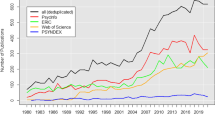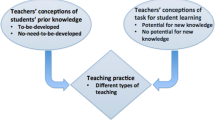Abstract
We studied the occurrence and nature of learningin a university first year Introduction toGeomorphology course, and its relations with priorknowledge taught in a prerequisite course, and withthe prior knowledge in the to be learned subjects. Tendimensions of knowledge were tapped before and afterthe course by conventional and cognitive structuremeasures that were derived by the concept mappingmethodology. The fine-grain analysis of learningoutcomes yielded the following results: (a) studentsacquired only a small portion of the content in thecourse Introduction to Geomorphology, (b) the priorgeological and geomorphological knowledge did notaffect the learning of the new geomorphologicalcontents, (c) the minor effects appeared within ratherthan across knowledge dimensions, and they affectedmainly the learning of smaller knowledge units, and(d) concept definition cannot be considereda valid probe of knowledge. The differential effects of prior knowledge question thecentral, global and undifferentiated role that schematheories ascribe to prior knowledge in futurelearning. They call for greater reference to theexposed dimensions of knowledge by suggestingadditional factors to be considered in the sequencingof courses, as well as to the acquisition of complexknowledge with partial meaning of the basic knowledgeunits, and the use of new cognitive structure probesof knowledge.
Similar content being viewed by others
References
Alexander, P.A., Schallert, D.L. & Hare, V.C. (1991). Coming to terms: How researchers in learning and literacy talk about knowledge. Review of Educational Research 61(3): 315–343.
Anderson, J.R. (1983). The Architecture of Cognition. New York: Freeman.
Anderson, J.R. (1995). Cognitive Psychology and Its Implications (4th edn.). New York: John Wiley & Sons.
Anderson, R.C. (1977). The notion of schemata and the educational enterprise. General discussion of the conference. In R.C. Anderson, R.J. Spiro & W.E. Montague, eds, Schooling and the acquisition of knowledge. Hillsdale, NJ: Erlbaum.
Ausubel, D.P., Novak, J. & Hanesian, H. (1985). Educational Psychology: A Cognitive View (2nd edn.). New York: Holt, Rinehart, & Winston.
Beckwith, J.B. (1991). Approaches to learning: Their context and relationship to assessment performance. Higher Education 22(1): 17–30.
Berry, D.C. & Dienes, Z. (1993). Implicit Learning: Theoretical and Empirical Issues. Hove: Erlbaum.
Beyerbach, B. & Smith, J. (1990). Using concept mapping program to assess preservice teachers about effective teaching. Journal of Research in Science Teaching 27: 961–971.
Bloom, B.S. (1976). Human Characteristics and School Learning. New York: McGraw-Hill.
Boujaoude, S.B. & Giuliano, F.J. (1994). Relationships between achievement and selective variables in a chemistry course for nonmajors. School Science and Mathematics 94(6): 296–302.
Caramazza, A., McKloskey, M. & Green, B. (1981). Naive beliefs in ‘sophisticated’ subjects: Misconceptions about trajectories of objects. Cognition 9: 117–123.
Carver, R.P. (1974). Two dimensions of test: Psychometric and edumetric. American Psychologist 7: 512–518.
Chacham, T. (1989). Construct Validation of the SConSAT Interview and Analysis Scheme. Unpublished master's thesis. Beer-Sheva: Ben-Gurion University of the Negev.
Champagne, A.B., Klopfer, L.E., DeSena, A.T. & Squires, D.A. (1981). Structural representations of students' knowledge before and after science instruction. Journal of Research in Science Teaching 18: 97–111.
Chan, C. & Bereiter, C. (1992). Effects of conflict and knowledge-processing strategy on conceptual change. Paper presented at the Annual Meeting of the American Educational Research Association (San Francisco, April).
Clement, J., Brown, D.E. & Zietsman, A. (1989). Not all preconceptions are misconceptions: Finding ‘anchoring conniptions’ for grounding instruction on students' intuitions. International Journal of Science Education 11: 554–565.
Dochy, F.J.R.C. (1992). Assessment of Prior Knowledge as a Determinant for Future Learning: The Use of Knowledge State Tests and Knowledge Profiles. Utrecht/London: Lemma/Jessica Kingsley Publishers.
Dochy, F.J.R.C. (1996). Assessment of domain-specific and domain-transcending prior knowledge: Entry assessment and the use of profile analysis. In M. Birenbaum and F.J.R.C. Dochy, eds, Alternatives in Assessment of Achievements, Learning Processes and Prior Knowledge. Boston/Dordrecht/London: Kluwer Academic Publishers.
Dochy, F.J.R.C. & Bouwens, M.R.J. (1990). Studies on the multi-functional nature of Courses in economics and the role of domain specific expertise. Ex Post Facto Research 1. Heerlen (Netherlands): Open University, Unpublished manuscript.
Dochy, F.J.R.C., Bouwens, M.R.J., Wagemans, L.J.J.M. & Niestadt, D.W. (1991). The role of subject-oriented expertise: A study of the impact of personal and contextual variables on success in an economics course as indicators of expertise. Ex post Facto Research 2. Heerlen (Netherlands): Open University, Unpublished manuscript.
Dochy, F.J.R.C. & Alexander, P.A. (1995). Mapping prior knowledge: A framework for discussion among researchers. European Journal for Psychology of Education 10(2): 123–145.
Dochy, F., Segers, M. & Buehl, M.M. (1999). The relation between assessment practices and outcomes of studies: The case of research on prior knowledge. Review of Educational Research 69(2): 145–186.
Eraut, M. (1994). Developing Professional Knowledge and Competence. London: Falmer.
Fillenbaum, S. & Rapoport, A. (1971). Structures in Subjective Lexicon. New York: Academic Press.
Fincher, K.R. (1992). The role of prior knowledge in inferential processing. Journal of Research in Reading 15(1): 12–27.
Gagne, E.D., Walker Yekovich, C. & Yekovich, F.R. (1993). The Cognitive Psychology of School Learning (2nd edn.). New York: Harper-Collins.
Glaser, R. & DeCorte, E. (1992). Preface. In F. Dochy, ed, Assessment of Prior Knowledge as a Determinant for Future Learning. Boston: Kluwer.
Haertel, B.D., Walberg, H.J. & Weinstein, Th. (1983). Psychological models of educational performance: A theoretical synthesis of constructs. Review of Educational Research 53(1): 75–91.
Hameed, H., Hackling M.W. & Garnett, P.J. (1993). Facilitating conceptual change in chemical equilibrium using a CAI strategy. International Journal of Science Education 15: 221–230.
Hegarty, H.E. & Prosser, M. (1991). Relationship between students' conceptual knowledge and study strategies-Part 2: Student learning in biology. International Journal of Science Education 13(4): 421–430.
Houston, J.P. (1991). Fundamentals of Learning and Memory (4th edn.). Fort Worth, TX: Harcourt, Brace & Jovanovich.
Hoz, R., Bowman, D. & Chacham, T. (1997). The psychometric and edumetric validity of dimensions of knowledge which are tapped by concept mapping. Journal of Research in Science Teaching 34(9): 925–947.
Hoz, R., Champagne, A.B. & Klopfer, L.E. (1992). The multitechnique-multimethod matrix for construct validation methodology: Application to the cognitive structure of physics concepts. Perceptual and Motor Skills 74: 3–35.
Hoz, R., Mahler, S., Tomer I., Yeheskel, N. & Elbaz, F. (1984). The Project for the Evaluation of Teacher Education, Annual Report 1984. Beer-Sheva: Ben-Gurion University of the Negev.
Hoz, R., Tomer, Y. & Tamir, P. (1990). The relations between disciplinary and pedagogical knowledge and the length of teaching experience of biology and geography teachers. Journal of Research in Science Teaching 27: 973–985.
Hoz, R., Tomer, Y., Bowman, D. & Chayoth, R. (1987). The use of concept mapping to diagnose misconceptions in biology and earth sciences. In J.D. Novak, ed, Proceedings of the Second International Seminar on Misconceptions and Educational Strategies in Science and mathematics. Ithaca, NY: Cornell University.
Hoz, R. & Kaplan, H. (1997). The effects of prior domain-specific knowledge on the acquisition of new contents in a “psychology of learning” course. Paper presented at the seventh conference of the European Association for Research on Learning and Instruction, Athens, Greece.
Jacobs, G. (1989). Word usage misconceptions among first year university physics students. International Journal of Science Education 11: 395–399.
Johnson, S.C. (1967). Hierarchical-clustering schemes. Psychometrika 32: 241–254.
Köerkel, J. (1987). Die Entwicklung von Gedächtnis-und Metagedächtnisleistungen in Abhängigkeit von bereichsspezificshen Vorkenntnissen. Frankfurt: Peter Lang.
Mahler, S., Hoz, R., Fischl, D., Tov-Ly, E. & Lernau, O.Z. (1991). Didactic use of concept mapping in higher education: Applications in medical education. Instructional Science 20: 25–47.
Marek, E.A., Cowan, C.C. & Cavallo, A.M.L. (1994). Students' misconceptions about diffusion: How can they be eliminated? American Biology Teacher 56: 74–77.
Markham, K.M., Mintzes, J.J. & Jones, M.G. (1994). The concept map as a research and valuation tool: Further evidence of validity. Journal of Research in Science Teaching 31(1): 91–101.
Mayer, R.E. (1979). Twenty years of research on advance organizers. Instructional Science 8: 133–167.
Morine-Dershimer, G. (1989). Preservice teachers' conceptions of content and pedagogy: Measuring growth in reflective, pedagogical decision-making. Journal of Teacher Education 40: 46–52.
Nitko, A.J. (1989). Designing tests that are integrated with instruction. In R.J. Linn, ed, Educational Measurement (3rd edn.). New York: ACE and Macmillan.
Novak, J.D.& Gowin, D.B. (1985). Learning How to Learn. New York: Cambridge University Press.
Odom, A.L. & Barrow, L.H. (1995). Development and application of a two-tier diagnostic test measuring college biology students' understanding of diffusion and osmosis after a course of instruction. Journal of Research in Science Teaching 32: 45–61.
Parkerson, J.A., Lomax, T.G., Schiller, D.P. & Walberg, H.J. (1984). Exploring causal models of educational achievement. Journal of Educational Psychology 76(4): 638–646.
Pomson, A.D.M. & Hoz, R. (1998). Sought and found: Adolescents' ‘ideal’ historical conceptions as unveiled by cognitive mapping. Journal of Curriculum Studies 30(3): 319–337.
Reigeluth, C.M.& Stein, F.S. (1983). The elaboration theory of instruction. In C.M. Reigeluth, ed, Instructional-Design Models: An Overview of the Current Status. Hillsdale, NJN.J.: Erlbaum.
Roschelle, J. (1991). Microanalysis of qualitative physics: Opening the black box. Paper presented at the Annual Meeting of the American Educational Research Association (Chicago, April).
Rumelhart, D.E. & Ortony, A. (1977). The representation of knowledge in memory. In R.C. Anderson, R.J. Spiro & W.E. Montague, eds, Schooling and the Acquisition of Knowledge. Hillsdale, NJ: Erlbaum.
Schallert, D.L. (1982). The significance of knowledge: A synthesis of research related to schema theory. In W. Otto & S. White, eds, Reading Expository Material. New York: Academic Press.
Stewart, J. (1979). Content and cognitive structure: Critique of assessment and representation techniques used by science education researchers. Science Education 63: 395–405.
Storey, R.D. (1992). Textbook errors and misconceptions in biology: Cell energetics. American Biology Teacher 54: 161–166.
Surber, J.R. (1984). Mapping as a testing and diagnosing device. In C.D. Holley & D.F. Dansereau, eds, Spatial Learning Strategies: Techniques, Applications and Related Issues. New York: Academic Press.
Tobias, S. (1994). Interest, prior knowledge and learning. Review of Educational Research 64(1): 37–54.
Tomer, Y. (1989). Evaluation of Acquisition of Pedagogical and Disciplinary Knowledge in Teacher Education. Unpublished doctoral dissertation. Beer-Sheva: Ben-Gurion University.
Weber, S. (1994). Evaluation of Knowledge Structures by Procedures of Networking-in the Context of Commercial Education. Paper presented at the Annual Meeting of the American Educational Research Association (New Orleans, April).
Willoughby, T., Wood, E. & Kan, M. (1994). Isolating variables that impact on or detract from the effectiveness of elaboration strategies. Journal of Educational Psychology 86(2): 279–289.
Winitzky, N., Kauchak, D. & Kelly, M. (1994). Measuring teachers' structural knowledge. Teaching and Teacher Education 10: 125–139.
Woloshyn, V.E., Pressley, M. & Schneider, W. (1992). Elaborative-interrogation and priorknowledge effects on learning of facts. Journal of Educational Psychology 84(1): 115–124.
Author information
Authors and Affiliations
Rights and permissions
About this article
Cite this article
Hoz, R., Bowman, D. & Kozminsky, E. The differential effects of prior knowledge on learning: A study of two consecutive courses in earth sciences. Instructional Science 29, 187–211 (2001). https://doi.org/10.1023/A:1017528513130
Issue Date:
DOI: https://doi.org/10.1023/A:1017528513130




